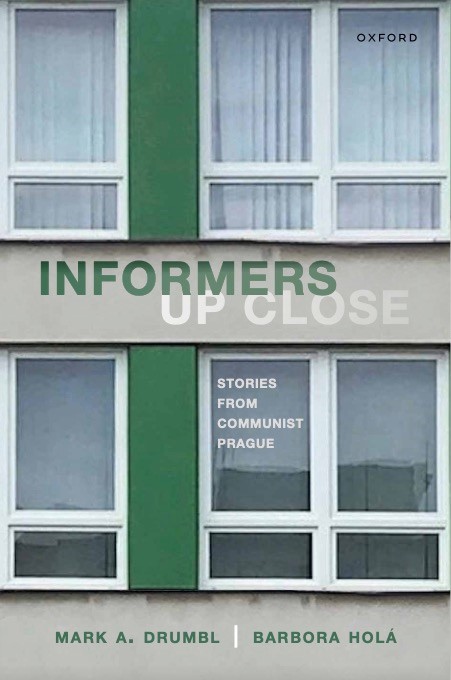Informers Up Close: Stories from Communist Prague
Informers contribute to the power of repressive regimes. While informers may themselves be victims, and are enlisted by the state, their actions can cause other individuals to suffer significant harm. Informers, then, are central to the proliferation of endemic human rights abuses. Informers Up Close: Stories from Communist Prague, by Mark A. Drumbl and Barbora Holá, is a ground-breaking book that explores two questions: (i) why ordinary people inform on others in repressive times, and (ii) how, after those times end, law and politics should speak of, to, and about informers.

Through a case-study of Communist Czechoslovakia (1945-1989)—and drawing from secret police archives, oral histories, and a broad gamut of secondary sources— Informers Up Close unravels the complex drivers behind informing and the dynamics of societal reactions to informing. It explores the agency of both informers and secret police officers.
By presenting informers ‘up close’, and the relationships between informers and secret police officers in high resolution granularity, Informers Up Close centers the role of emotions in informer motivations and underscores the value of dignity in transitional reconstruction. This book also leverages research from informing in authoritarian states to better understand informing in so-called liberal democratic states which, after all, also rely on informers to maintain law and preserve order.
17 remaining file-stories
Informers Up Close revolves around 23 ‘file-stories’ of individuals who informed to the secret police in Communist Czechoslovakia. These ‘file-stories’ are detailed biographical narratives developed through our careful interpretation of information contained in voluminous secret police files archived in Prague.
Six of these file-stories are presented in full in the book. Here you can find the remaining 17 which, although synthetically discussed in the book, are not fully excerpted therein. In this regard, this website serves a crucial companion and complementary role to the published book.
We believe that these 17 high-resolution and biopic file-stories can serve important research and pedagogical purposes, including as case-studies for teaching and instruction. They offer fascinating vignettes of life as lived in Czechoslovakia during the Cold War. They can guide and interactively kindle discussion of the complexities of a number of themes including: agency and constraint under repression; the role of disposition versus situation to explain participation of individuals in massive human rights abuses; complicity and victimhood; provenance of mass violence and role of individuals therein; history of Communist regimes in Eastern Europe from below; and comparisons to informers in liberal democratic societies. These file-stories are presented in narrative format. They are suitable for educational purposes at all levels, from high school to doctoral level programs; and also for professional training instruction in areas as diverse as policing, military intelligence, and public administration.
These file-stories demonstrate the complexities of the relationships between state and individuals in repressive regimes, in particular Communist Czechoslovakia. They show how individuals initially often had to make ‘choiceless choices’ and sign a pledge to cooperate with the secret police but progressively over time became adept and willing informers. The stories demonstrate how some informers eagerly and enthusiastically collaborated with the regime, above and beyond what was expected and requested of them. Other informers, conversely, developed proficiencies to game the regime and the system – in their own little yet crucial ways — by avoiding, stalling, or ignoring requests from the secret police.
The file-stories thus reveal the engineering effects of the state and the agentic contributory role of individuals. Each file-story showcases a deeply personal cocktail of emotions that pulled informers towards and pushed informers away from the secret police and vivifies how these sentiments changed and morphed over time. Informing, in this sense, reflects tactics and strategies of social navigation through the bartering of information. This is one of the main themes we explore in our book. Our book helps demystify informing, and presents a humanistic portrayal that is conducive to reconciliation while also redressing harm.
In order not to inflict additional harm upon individuals and to respect principles of ethical archival research, we have pseudonymized the file-stories. We have, therefore, not used the real names of individual informers but rather have opted to use their cover names, which are not unique. Furthermore, we use only initials or first names of other persons appearing in the files and omit any other identifying information, such as exact places (for example, addresses) or personal dates (including dates of birth or marriage). The quotations in the file-stories are taken directly from the secret police files themselves, and have been translated into English from Czech or on occasion from Slovak.
More information about using Informers Up Close
Should you wish to avail yourself of these file-stories as research or instructional material, please feel free to contact either of us to let us know: Professor Barbora Holá at b.hola@vu.nl and Professor Mark Drumbl at drumblm@wlu.edu. We believe in principles of open access and in reciprocity would like to hear from you as professional courtesy. We would also ask that you consider supporting these principles by considering to link these materials to our book itself, which can be obtained from major on-line booksellers (Amazon, WH Smith etc.) in hard-copy or e-book formats, or directly from Oxford University Press as well from its UK, US, or world-side websites. You can also encourage your library to purchase it so that it can be put on tap in cost-effective fashion to a larger number of readers. The book is very well suited to use as a teaching book in a variety of classes in law, politics, transitional justice, actors in repression, historical memory, repressive regimes, and (social) psychology.
Download Informers Up Close file-stories | Online Appendix

